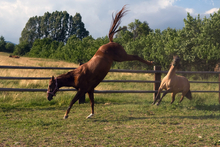A news article in The Daily Pennsylvanian, the student newspaper for Penn's School of Veterinary Medicine, written by Allison Bart gives details of a very special Equine Behavior Program that allows students to study horses in their natural environment.

New Bolton Center; key to behavior in horses
Unique to Penn’s School of Veterinary Medicine, just minutes away is a large herd of semi-feral horses for students to study.
Since the 1980s, veterinary students have had access to observe and study horses through the school’s New Bolton Center located in Chester County. About 45 minutes away from the heart of campus sits something that is unique to Penn’s School of Veterinary Medicine — a large herd of semi-feral horses.
In 1994, the center launched the Equine Behavior Program, which is today one of only a few horse behavior programs in the country.
The center’s 700 acres are home to about 90 ponies — all of which are part of one of the largest horse behavior research programs in the world, according to Sue McDonnell, founder and head of the Equine Behavior Program.
Since its launch, the program has been expanding rapidly.
While the program’s early work was focused on reproductive and breeding behavior, it has since grown into a full-service veterinary program focused on the study of horses in their natural social setting, McDonnell said.
Today, all veterinary students are required to take courses at the New Bolton Center before earning their degree.
“Having an equine behavior program here at Penn allows students to learn the fundamentals of equine behavior and then some techniques to affect equine behavior so that they can be safe and effective veterinarians,” assistant professor of medicine at the New Bolton Center Rose Nolen-Walston said.
Apart from a few preventative measures like necessary health care, the horses at the center are left to live as they would in natural conditions without human interference.
Though the Equine Behavior Program was meant only to be a short-term project, McDonnell is pleased that the school has stuck with it.
“It is a great living laboratory for students to see how horses interact under normal social situations, meaning that they’re out there and we don’t interfere with anything,” McDonnell said.
